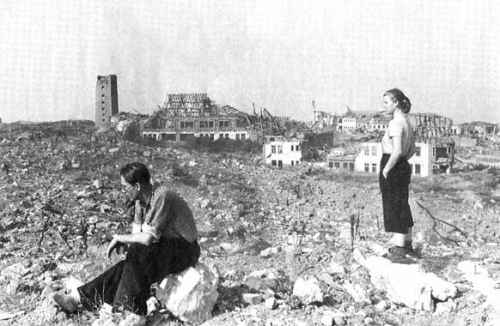
April 23
1858 Birth: Max Planck: German theoretical physicist:
He studied at Munich and Berlin, where he studied under Helmholtz, Clausius, and Kirchhoff, and subsequently joined the faculty. He became professor of theoretical physics (1889-1926). His work on the law of thermodynamics and the distribution of radiation from a black body led him to abandon classical Newtonian principles and introduce the quantum theory (1900), for which he was awarded the Nobel Prize for Physics in 1918. This assumes that energy is not infinitely sub-divisible, but ultimately exists as discrete amounts he called quanta (Latin, "how much"). Further, the energy carried by a quantum depends in direct proportion to the frequency of its source radiation. When the Nazis seized power in 1933, Planck had already reached the age of seventy-four; he had to witness how many Jewish friends and colleagues were expelled from their positions and humiliated, and how hundreds of scientists emigrated from Germany. Again he tried the 'persevere and continue working' slogan and asked scientists who were considering emigration to stay in Germany. He still hoped that the crisis would abate soon and that the political situation would improve again. There was also a deeper argument against immigration: emigrating German scientists would need to look for academic positions abroad, but these positions should better be reserved for those scientists with Jewish background, who had no chance of continuing to work in Germany. [For further details, Click here.]
1871 Birth: Edmund Henry Hynman Allenby:
Field Marshal Edmund Henry Hynman Allenby, 1st Viscount Allenby GCB, GCMG, GCVO (23 April, 1861‑-14 May, 1936) was a British soldier and administrator most famous for his role during World War I, in which he led the Egyptian Expeditionary Force in the conquest of Palestine and Syria in 1917 and 1918.
Allenby, nicknamed the "Bloody Bull", is generally considered to have been a martinet who tyrannically ruled over the men serving under him. However, Archibald Wavell, a British field marshal during World War II who had served under Allenby, defends him as being an intelligent and caring man, if a professional consummate soldier. T. E. Lawrence ("Lawrence of Arabia"), whose efforts with the Arab Revolt were greatly aided by Allenby, thought similarly of him: "(He was) physically large and confident, and morally so great that the comprehension of our littleness came slow to him".
Allenby was arguably one of the most successful British commanders of the war, utilizing strategies he developed from his experiences in the Boer War and on the Western Front towards his Palestinian Campaigns of 1917-8. His management of the Battle of Megiddo in particular, with its brilliant use of infantry and mobile cavalry, is considered by many to be a precursor to the Blitzkrieg tactics so widely employed by Germany during World War II.
During World War I he initially served on the Western Front. At the outbreak of war a BEF was sent to France, consisting of four infantry divisions and one cavalry division, the latter commanded by Allenby, who distinguished himself when his unit covered the retreat after the Battle of Mons. As the BEF was expanded in size to two Armies, he was rewarded by being made commander of the Cavalry Corps. In 1915 he commanded V Corps during the Second Battle of Ypres and in October he took charge of the British Third Army.
However at the Battle of Arras in the spring of 1917, his forces failed to exploit a breakthrough and he was replaced by Julian Byng on 9 June. A significant reason for his removal from command and transfer was his continuing feud with Field Marshal Haig over tactical matters. Shortly after his arrival in Egypt, he learned that his son, Michael, had been killed on the Western Front by German artillery.
He retired in 1925 and died very suddenly, from a ruptured cerebral aneurysm, on 14 May, 1936 in London. His ashes were buried in Westminster Abbey. (History.com)
[Perhaps the most endearing action of Allenby was that, in contrast to Kaiser Wilhelm II, he refused to ride into the Old City of Jerusalem, and walked in.‑‑Ed.]
1876 Birth: Arthur Moeller van den Bruck: German historian: In his book Das Recht der jungen Voelker ("The Right Of Young Nations"), in which he presents the interests of Germany, Russia, and the United States and develops an expressly anti-Western and anti-imperialist philosophy of the state (Staatstheorie), Moeller van den Bruck attempts primarily to bridge the gap between nationalism and concepts of social justice. He had a major influence on the Jungkonservativen in their opposition to the Treaty of Versailles. He may have also supplied the Nazis with some of the concepts underpinning their movement, though upon meeting Hitler in 1922 he rejected him for his "proletarian primitiveness". The Nazis nevertheless made use of his ideas where they could, including appropriating the title of his 1923 book Das Dritte Reich ("The Third Reich") as a political slogan. [For further details, Click here.]
1893 Birth: Allen Dulles: first civilian Director of the American Central Intelligence Agency: Dulles was active in the Office of Strategic Services in Berne, Switzerland during World War II. He worked on intelligence regarding German plans and activities. Dulles's career was jump-started by the information provided by Fritz Kolbe, a German diplomat and a foe of the Nazis. Kolbe supplied secret documents regarding active German spies and plans regarding the Messerschmitt Me 262 jet fighter. [For further details, Click here.]
1895 Triple Intervention: Russia persuades Germany and France to gang up on the Japanese with unrelenting diplomatic pressure; an attempt to deny them their war prize of Port Arthur. The three powers successfully compel Japan to return the Liaodong peninsula to China this day. (Connaughton) If new warships are considered necessary we must, at any cost, build them: if the organization of our army is inadequate we must start rectifying it from now; if need be, our entire military system must be changed . . . . At present Japan must keep calm and sit tight, so as to lull suspicions nurtured against her; during this time the foundations of nautical power must be consolidated; and we must watch and wait for the opportunity in the Orient that will surely come one day. When this day arrives, Japan will decide her own fate. 1897 Birth: Lucius Clay: American general and military governor best known for his administration of Germany immediately after World War II. Clay is considered the 'father' of the Berlin Airlift (1948-49). [For further details, Click here.]
1898 Spanish-American War: Spain breaks off diplomatic relations with the United States and declares war. (Trask) 1915 World War I: Various: List Regiment: Gefreiter Adolf Hitler's 16 Reserve Infantry Regiment occupy a position, at Fromelles (pictured above in a drawing by Hitler), which is on a level field with water channels, willow trees and willow stalks, in the distance towards the enemy lines lie an insignificant wood with barbed wire entanglements. Under the direction of their defense-minded commander, Lieutenant General Gustav Scanzoni von Lichtenfels, the regiment works ceaselessly day and night in the subsequent weeks, to further fortify their position at Fromelles. [For further details, Click here.]
Death: Poet-soldier Rupert Brooke:
Rupert Brooke, a young scholar and poet serving as an officer in the British Royal Navy, dies of blood poisoning on a hospital ship anchored off the Greek island of Skyros, while awaiting deployment in the Allied invasion of the Gallipoli Peninsula . . . .
Brooke sailed for the Dardanelles near Turkey on February 18, 1915; problems with enemy mines led to a delay in his squadron's deployment, and a training stint in Egypt, where Brooke contracted dysentery. By this time, Brooke's poems had begun to gain notice in Britain, and he was offered the chance to return to Britain and serve away from the battlefield after his recovery; he refused. On April 10, he sailed with his unit to Greece, where they anchored off Skyros. There, Brooke developed a fatal case of blood poisoning from an insect bite; he died on April 23, 1915, aboard a hospital ship, two days before the Allies launched their massive, ill-fated invasion of Gallipoli.
On April 26, The Times of London ran an obituary notice for Brooke written by Winston Churchill. The thoughts to which he gave expression in the very few incomparable war sonnets which he has left behind, Churchill wrote, will be shared by many thousands of young men moving resolutely and blithely forward in this, the hardest, the cruelest, and the least-rewarded of all the wars that men have fought. The opening lines of The Soldier, Brooke's most famous poem, evoke the simple, heartfelt patriotism to which Churchill felt all England's soldiers should aspire:
If I should die, think only this of me 1916 World War I: List Regiment: Gefreiter Adolf Hitler endures trench warfare in Flanders (Artois) with 3 Company, 16 Reserve Infantry Regiment. [For further details, Click here.] 1917 World War I: List Regiment: Gefreiter Adolf Hitler's 16 Reserve Infantry Regiment, 3 Company, fortify trenches near Arras. [For further details, Click here.] 1918 World War I: Various: Zeebrugge raid:
The objectives were the canal of Zeebrugge and the entrance to the harbour of Ostend. Three cruisers, Intrepid, Iphigenia and Thetis, each duly packed with concrete and with mines attached to her bottom for the purpose of sinking her, Merrimac-fashion, in the neck of the canal, were aimed at Zeebrugge; two others, similarly prepared, were directed at Ostend. The old cruiser Vindictive, with two ferry-boats, Iris and Daffodil, was to attack the great half-moon Mole which guards the Zeebrugge Canal, land blue-jackets and marines upon it, destroy what stores, guns, and Germans she could find, and generally create a diversion while the block-ships ran in and sank themselves in their appointed place. Vice-Admiral Keyes, in the destroyer Warwick, commanded the operation. There had been two previous attempts at the attack, capable of being pushed home if weather and other conditions had served. The night of the 22nd offered nearly all the required conditions, and at some fifteen miles off Zeebrugge the ships took up their formation for the attack. [For further details, Click here.]
List Regiment: Gefreiter Adolf Hitler's 16th RIR constructs fortified works in difficult defensive positions on an active front with German assault regiments near Fountaine (Montdidier). [For further details, Click here.] 1934 Nazi Germany: Brandenburg concentration camp is closed by the Gestapo. (THP)
1935 Various:
Holocaust: Germany: The Nazi Race Bureau declares that Jewish children will be excluded from German public schools. (THP)
Antisemitism: Poland: A new Polish constitution is adopted that severely limits minority rights, especially for Jews.
1941 Various:
Church and Reich: Adolf Wagner, Gauleiter and Minister of Education and Religious Affairs in Bavaria, issues an order prohibiting the opening of the school day with a prayer; and suggests the gradual removal of all crucifixes (See August 28, 1941). (THP)
World War II: Greece: King George of the Hellenes, and the Greek government flee the Greek mainland from the advancing Germans; the Greek army surrenders.
World War II: USA: At an 'America First' rally in New York City, aviator Charles Lindbergh declares, 'It is obvious that England is losing the war'.
1942 Various:
World War II: Germans begin "Baedeker Raids" on England:
In retaliation for the British raid on Luebeck, German bombers strike Exeter and later Bath, Norwich, York, and other "medieval-city centres." Almost 1,000 English civilians are killed in the bombing attacks nicknamed "Baedeker Raids."
On March 28 of the same year, 234 British bombers struck the German port of Luebeck, an industrial town of only "moderate importance." The attack was ordered (according to Sir Arthur Harris, head of British Bomber Command) as more of a morale booster for British flyers than anything else, but the destruction wreaked on Luebeck was significant: Two thousand buildings were totaled, 312 German civilians were killed, and 15,000 Germans were left homeless.
As an act of reprisal, the Germans attacked cathedral cities of great historical significance. The 15th-century Guildhall, in York, as an example, was destroyed. The Germans called their air attacks "Baedeker Raids," named for the German publishing company famous for guidebooks popular with tourists. The Luftwaffe vowed to bomb every building in Britain that the Baedeker guide had awarded "three stars."
Resistance: The "White Rose" begins distributing leaflets composed by a group of students and a professor of philosophy at the University of Munich. Their leaflets tell of the murders of 300,000 Jews in Poland and ask why the German people remain so apathetic in the face of these "revolting crimes." Nothing is so unworthy of a civilized nation as allowing itself to be governed without opposition by an irresponsible clique that has yielded to base instinct. It is certain that today every honest German is ashamed of his government. Who among us has any conception of the dimensions of shame that will befall us and our children when one day the veil has fallen from our eyes and the most horrible of crimes‑-crimes that infinitely outdistance every human measure‑-reach the light of day? If the German people are already so corrupted and spiritually crushed that they do not raise a hand, frivolously trusting in a questionable faith in lawful order of history; if they surrender man's highest principle, that which raises him above all other God's creatures, his free will; if they abandon the will to take decisive action and turn the wheel of history and thus subject it to their own rational decision; if they are so devoid of all individuality, have already gone so far along the road toward turning into a spiritless and cowardly mass then, yes, they deserve their downfall. [For further details, Click here.]
1943 Various:
Holocaust: Warsaw ghetto: The SS begins an all-out operation to eliminate the remaining Jews still in hiding. Resistance continues for three more weeks. (See May 8 and May 16) A racial German reported that again some Jews had escaped through the sewers into the Aryan part of the city. We learned from a traitor that there were some Jews in a certain house. A special motorized raiding party invaded the building and caught 3 Jews, 2 of them females. During this operation their motor-car was pelted with one incendiary bottle and one explosive; 2 policemen were wounded. The whole operation is rendered more difficult by the cunning way in which the Jews and bandits act; for instance, we discover that the hearses which were used to collect the corpses lying around at the same time bring living Jews to the Jewish cemetery, and thus they are enabled to escape from the Ghetto. [For further details, Click here.]
Resistance: From the diary of Chaim Kaplan:
The Community Council‑-the Judenrat, in the language of the Occupying Power‑-is an abomination in the eyes of the Warsaw Community. When the Council is so much as mentioned, everyone's blood begins to boil. If it were not for fear of the Authorities there would be bloodshed. [For further details, Click here.]
Holocaust: The Last Letter From Mordecai Anielewicz (Warsaw Ghetto Revolt Commander):
It is impossible to put into words what we have been through. One thing is clear, what happened exceeded our boldest dreams. The Germans ran twice from the ghetto. One of our companies held out for 40 minutes and another for more than 6 hours. The mine set in the "brushmakers" area exploded. Several of our companies attacked the dispersing Germans. Our losses in manpower are minimal. That is also an achievement. Y. [Yechiel] fell. He fell a hero, at the machine-gun. I feel that great things are happening and what we dared do is of great, enormous importance . . . . Beginning from today we shall shift over to the partisan tactic. Three battle companies will move out tonight, with two tasks: reconnaissance and obtaining arms. Do you remember, short-range weapons are of no use to us. We use such weapons only rarely. What we need urgently: grenades, rifles, machine-guns and explosives. It is impossible to describe the conditions under which the Jews of the ghetto are now living. Only a few will be able to hold out. The remainder will die sooner or later. Their fate is decided. In almost all the hiding places in which thousands are concealing themselves it is not possible to light a candle for lack of air. With the aid of our transmitter we heard the marvelous report on our fighting by the "Shavit" radio station. The fact that we are remembered beyond the ghetto walls encourages us in our struggle. Peace go with you, my friend! Perhaps we may still meet again! The dream of my life has risen to become fact. Self-defense in the ghetto will have been a reality. Jewish armed resistance and revenge are facts. I have been a witness to the magnificent, heroic fighting of Jewish men in battle. M. Anielewicz [Kann]
World War II: Anglo-US Headquarters is set up in London to plan the invasion of Europe.
1945 World War II: Various:
Hitler wakes in a foul mood. When his quack doctor, Theodor Morell (above), offers to give him an injection of morphine to calm his nerves, the paranoid Fuehrer accuses him of attempting to knock him out so that he can be transported to Berchtesgaden against his will, and abruptly dismisses him. (Read) By the afternoon situation conference (3 PM), Hitler shows all the signs of a man going through drug withdrawal. For the first time in many months, he is without his daily dose of an amphetamine cocktail that is usually administered by his just dismissed 'doctor.' After learning that Soviet forces have taken Eberswalde without a fight, and that Steiner has refused to give the order for a futile counterattack north of the city, Hitler listens in silence.
Note: This a very dangerous move by Himmler. Had he put out this feeler with Hitler's approval, it would have been merely a cynical ploy to cause dissention among the Allies. Were it handled right and cleverly leaked, it might have done much to further distrust between the two, either way the 'negotiations' go. But his doing this behind Hitler's back is clearly treason, and will give said Allies the opportunity to turn the tables, and sow dissention in the Nazi ranks. (Read) Goering: In Berchtesgaden, Goering hears the news of Hitler's breakdown from a phone call from Koller. He orders Koller to join him at Obersalzberg. Upon arriving, Koller tells Goering of Hitler's resolve to stay in Berlin, as well as of and his statement that Goering would be a better choice to take over leadership in the south and direct negotiations with the enemy. Goering remarks that Hitler has played a 'mean trick' on him and put him in a very difficult position. Koller will later write an account of the meeting: 'Then he asked me whether I thought that Hitler was still alive or whether he had, perhaps, appointed Martin Bormann as his successor. I told him Hitler was alive when I left Berlin.' Koller urges him to seize the moment, but Goering is wary. 'Bormann is my deadly enemy,' Goering explains. 'He is only waiting to get at me. If I act, he will call me a traitor. If I don't, he will accuse me of having failed at the most difficult hour.' Goering sends a message to Hitler: My Fuehrer, Since you are determined to remain at your post in Fortress Berlin, do you agree that I, as your deputy in accordance with your decree of 29.6.41, assume immediately total leadership of the Reich with complete freedom of action at home and abroad? If by 2200 hours no answer is forthcoming, I shall assume that you have been deprived of your freedom of action. I will then consider the terms of your decree to have come into force and act accordingly for the good of the people and the Fatherland. You must realize what I fell for you in these most difficult hours of my life, and I am quite unable to find words to express it. God bless you and that you may come here (to Berchtesgaden) after all as soon as possible. Your most loyal Herman Goering. Hitler takes lunch with Eva Braun and his secretaries—and the conversation turns to suicide. Hitler states that the best way is to put a gun in your mouth and pull the trigger: "The skull is shattered and death is instantaneous." Eva Braun is horrified, and protests that she has been counting on leaving a beautiful corpse behind. She suggests cyanide, and Hitler concurs. Traudl Jung will later tell Gitta Sereny: "So Gerta Christian and I asked whether he would give us each one of the cyanide pills Himmler had brought. And after lunch he came and handed us each one of them. He said he was sorry he couldn't offer us a better farewell present." (Sereny) Goebbels family: While the other paladins are fleeing the Nazi capital, Goebbels' family moves into the Bunker. Two limousines arrive at the Bunker just after lunch carrying Magda Goebbels and her six small children, each holding the one toy apiece that they have been allowed to bring with them. Goebbels himself already inhabits the small room next to his Fuehrer's in the lower level Bunker, so Magda and the children move into the four small rooms in the upper level just vacated by Dr. Morell. The Goebbels' children are quite fond of their 'Uncle Adolf' and look on the whole process as an exciting adventure. Goebbels had earlier confided to Speer: 'My wife and family are not to survive me. The Americans would only coach them to make propaganda against me.' Hitler's secretary, Traudl Junge, later leads the children up to the ruined Chancellery to raid the stash of birthday presents recently given to Hitler in search of additional playthings. Jung will later tell Sereny: "We knew their parents were going to kill them. Of course, they didn't know. One of them told an orderly who played with them that they were all going to have an injection so they wouldn't get sick. So you see, they had prepared them." (Read, Sereny)
From Speer's IMT testimony:
On 23 April I flew to Berlin in order to take leave of several of my associates, and—I should like to say this quite frankly—after all that had happened, also in order to place myself at Hitler's disposal. Perhaps this will sound strange here, but the conflicting feelings I had about the action I wanted to take against him and about the way he had handled things, still did not give me any clear grounds or any clear inner conviction as to what my relations should be toward him, so I flew over to see him. I did not know whether he knew of my plans, and I did not know whether he would order me to remain in Berlin. Yet I felt that it was my duty not to run away like a coward, but to stand up to him again. It was on that day that Goering's telegram to Hitler arrived. This telegram was not to Hitler, but from Goering to Ribbentrop; it was Bormann who submitted it to him. Albert Speer—in his best selling books about the period—claimed to have been present at a remarkable number of key moments and events. This is perhaps one of the moments he actually witnessed first hand. He will later write: 'Perhaps this was Bormann's last effort to induce Hitler to fly to Berchtesgaden and take control there.' Speer then relates that Bormann—waving the printout of Goering's message in his hand—declares it proof that Goering is staging a coup d'etat. He fails to get a reaction from a still apathetic Fuehrer. However, the text of a further message from Goering addressed to Reich Foreign Minister Ribbentrop—with a copy intended for Keitel—is delivered to Bormann, who immediately reads it aloud to Hitler and Speer. (Speer, Read) Hermann Goering's radio message to Ribbentrop: "I have asked the Fuehrer to provide me with instructions by 10 PM 23 April. If by this time it is apparent that the Fuehrer has been deprived of his freedom of action to conduct the affairs of the Reich, his decree of 29 June 1941 becomes effective, according to which I am heir to all his offices as his deputy. (If) by 12 midnight, 23 April 1945, you receive no word either from the Fuehrer or from me, you are to come to me at once by air." From Albert Speer's later account: "'Goering is engaged in treason!' Bormann cried. 'He's already sending telegrams to members of the government and announcing that on the basis of his powers he will assume your office at twelve o'clock tonight, my Fuehrer!' . . . . An outburst of wild fury (from Hitler) followed, in which feelings of bitterness, helplessness, self-pity and despair mingled. With flushed face and staring eyes, Hitler ranted on as if he had forgotten the presence of his entourage: 'I've known it all along. I know that Goering is lazy. He let the air force go to pot. He was corrupt. His example made corruption in our state. Besides, he's been a drug addict for years. I've known it all along.' As suddenly as it had begun, the tantrum ends with a statement of resignation: 'Well, all right. Let Goering negotiate the surrender, it doesn't matter who does it.' He will soon change his mind again. (Speer) 
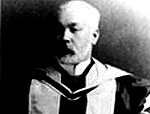
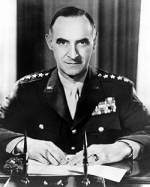

That there's some corner of a foreign field
That is for ever England.


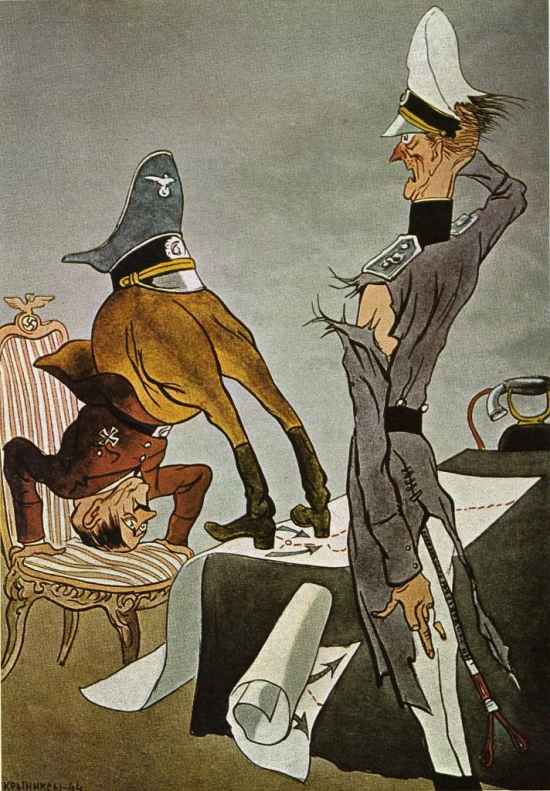
Then, in an episode some historians will describe as a nervous breakdown, Hitler suddenly leaps up and, while flushed in the face and trembling violently, sputteringly rants and raves against them all, declaring that they are guilty of every evil attribute from cowardice to incompetence. 'The war is lost,' he screams. 'Everything is falling apart.' He states that suicide is now his only recourse: 'Alive or dead,' he declares, 'I shall not fall into the hands of the enemy. I can no longer fight on the battlefield; I'm not strong enough. I shall shoot myself.' He then slumps into his seat and begins to sob: 'The war is lost. I shall shoot myself.' (Read)
For a full five minutes after Hitler declares that he shall stay in Berlin and commit suicide, no one in the Bunker speaks. Then, with the encouragement of the others, Jodl—in an attempt to salvage at least some of his Fuehrer's until-now-unbounded confidence—makes a proposal. He suggests that the German Twelfth Army under General Walther Wenck, now facing the Americans, should move to Berlin. He proposes that this can now be done because the Americans, already on the Elbe River, are unlikely to move further east any time soon. Hitler immediately grasps the straw Jodl presents and orders Wenck to disengage from the Americans and move the Twelfth Army north-east to support Berlin. He later gives further orders that Twelfth Army should attempt a link-up with Ninth Army.
At some point, Hitler orders Bormann, Keitel and Jodl to fly to Berchtesgaden. All three refuse. Keitel, in Jodl's presence, declares: 'In seven years I have never refused to carry out an order from you, but this is one order I shall never carry out. You cannot and should not leave the Wehrmacht in the lurch at a time like this.' 'I am staying here,' Hitler stubbornly replies, 'and that is that. Goering can take over the leadership down there. If there has to be any negotiating with the enemy, as there has to be now, then Goering is better at that then I am. Either I fight and win the Battle of Berlin of Berlin - or I am killed in Berlin. That is my final and irrevocable decision." (Clark, Read, Keitel)
After Hitler's tantrum, the telephone lines from Berlin to what is left of the Reich buzz with the news. Reich Foreign Minister Joachim von Ribbentrop, upon hearing of his Fuehrer's breakdown, calls to buck him up, promising a great diplomatic breakthrough to win the day. Himmler calls and makes an impassioned plea for him to not give up hope. After replacing the receiver he mutters, 'They're all mad in Berlin. What am I to do?'
The one thing he does not do is go the Fuehrerbunker himself. Instead, he sends Dr. Gebhart to offer Hitler the services of Himmler's own 600 man SS escort squad. He then sends Schellenberg to Luebeck to meet with unofficial back channel Red Cross envoy Bernadotte. Schellenberg is instructed to officially request—in Reichsfuehrer SS Himmler's name—that Bernadotte approach Eisenhower with an immediate offer of surrender in the West (but, of course, not in the East). 
The Fuehrer decree concerning Hitler's successor is located and read aloud: Should I have my freedom of action curtailed or be otherwise incapacitated, Reich Marshal Hermann Goering is to be my deputy and successor in all offices of State, Party, and Wehrmacht.' The State Secretary of the Reich Chancellery is reached on the phone (remarkably, the telephone system will continue to function through most of the Battle for Berlin) for a legal opinion; Lammers: 'The law of 29 June 1941 is valid and legally binding. The Fuehrer has made no other order. If he had, I would have known. He could not have changed the decree legally without me.' Koller suggests that Goering send a message to Hitler seeking his approval. Keeping Lammers on the line, the three of them draft a carefully worded message to their Fuehrer. (Read)
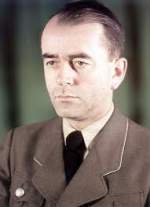
Hitler was unusually excited about the contents of the telegram, and said quite plainly what he thought about Goering. He said that he had known for some time that Goering had failed, that he was corrupt, and that he was a drug addict. I was extremely shaken, because I felt that if the head of the State had known this for such a long time, then it showed a lack of responsibility on his part to leave such a man in office, when the lives of countless people depended on him. It was typical of Hitler's attitude towards the entire problem, however, that he followed his statement up by saying: 'But let him negotiate the capitulation all the same' . . . . He said (it) in an offhand manner: 'It doesn't matter anyway who does it.' He expressed all his disregard for the German nation in the way he said this.
At 5 PM, Goering receives a message from Bormann in Hitler's name: 'The decree of 29.6.41 only comes into effect on my specific agreement. There can be no talk of lack of freedom to act. I forbid you to take any steps in the direction you have indicated.' Goering immediately orders that a signal go out to Ribbentrop and Keitel canceling his previous message. However, just minutes later a further communication from the Fuehrerbunker . He is told that because of his long service his life is to be spared, but he must immediately resign from all his official offices, titles, and duties. Goering does so within the next half an hour. (Read)
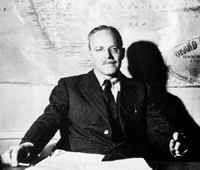
OSS chief Allen Dulles receives an urgent phone call from Max Waibel, a Swiss intelligence officer. He will later recall the moment in his memoirs:
He had astounding news. General Wolff, his adjutant, Major Wenner, and one of Vietinghoff's high staff officers, Lt. Col. Viktor von Schweinitz, were on their way to Switzerland. They were coming to surrender...Wolff and Schweinitz were ready to go to Caserta immediately to arrange for the capitulation of all the German forces, Wehrmacht and SS, in North Italy. They proposed an immediate meeting with me in Lucerne to arrange the details of the trip to Allied headquarters. And I was under the strictest military orders to have no dealings with them! (Dulles)

Holocaust: Count Bernadotte, the Swedish Red Cross envoy, meets for the fourth time with the Reichsfuehrer SS. "Hitler is very probably already dead," Himmler tells him, and drafts a letter to be handed by Bernadotte to the Swedish Foreign Minister to be passed on to the Allies. (Kershaw)
Death: Klaus Bonhoeffer: brother of Dietrich Bonhoeffer:Soon after completing law studies in 1935, Klaus Bonhoeffer became a senior corporate attorney with Deutsche Lufthansa. He was married to Emilie Delbrueck, with whom he had a daughter and two sons. In close cooperation with his brothers-in-law Hans von Dohnanyi, Justus Delbrueck, and Ruediger Schleicher, he utilized his opportunities to travel at an early stage to establish contacts with a broad range of resistance groups in the diplomatic community and among the clergy in Germany and abroad. He became party to the assassination plans of the group of conspirators around Ludwig Beck and Carl Goerdeler. Klaus Bonhoeffer was arrested on October 1, 1944, and sentenced to death by the People's Court on February 2, 1945.
In the night of April 22-23, 1945, he was taken with a group of prisoners from the Lehrter Strasse Prison to some nearby ruins and surreptitiously shot by a special unit of the Reich Security Main Office.
Death: Albrecht Haushofer: German Resistance intellectual:
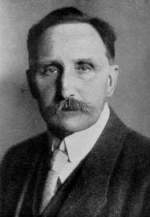
In Nazi Germany's Berlin-Moabit prison, with the Red Army fast approaching, the SS executed Albrecht Haushofer for his part in the previous year's July 20 plot to assassinate Adolf Hitler.
A social and political conservative and driving force behind the nascent field of "geopolitics," which held views of the State "as a geographic organism or a spatial phenomenon" that were incorporated into the National Socialist ideology of "Lebensraum," Haushofer was an early darling of the drive to find academic and scientific justification for Nazi beliefs and ideals: this despite his own part-Jewish parentage.
Haushofer had reservations about the intentions of the Nazi party following its rise to power in the 1930s, but he nonetheless consented to represent it in foreign affairs, having spent significant time abroad as a geopolitics student in the 1920s. Acting as chief foreign affairs adviser to Rudolf Hess, Hitler's chief deputy, Haushofer traveled widely to promote German foreign policy. During this time, he wrote a series of historical dramas‑-Scipio (1934), Sulla (1938), and Augustus (1939)‑-containing progressively more strident symbolic criticisms of his age.
Believing that Germany must not get involved in another disastrous foreign war, Haushofer was a significant force in negotiating for peace with Britain and France. "The peoples of Europe are in a position in which they have to get on together lest they all perish," he wrote; "and although one realises that it is not common sense but emotional urges which govern the world, one must try to control such urges." As Hitler's desire for war became ever more paramount, however, Haushofer lost his position with the government and returned to Germany, remaining active in secret talks to persuade the British to accept a new peace agreement.
With the outbreak of the Second World War, Haushofer remained a professor of geopolitics at the University of Berlin, but distanced himself from his Nazi past and began associating with elements of the German resistance. As the war wore on, he consistently opposed any attempt on Hitler's life, but finally agreed to join the July plot as the only way to end the war without bringing further disaster upon Germany. With the plot's failure, he was arrested by the Gestapo, and executed just days before the Red Army liberated Berlin.
Haushofer composed the Moabiter Sonette while in prison, a series of poems posthumously published in 1946 regarded as among the most powerful documents of the German antiwar movement. One of his most well-known sonnets, "Schuld," attempts to express‑-in sad retrospect‑-the weight of his moral guilt in the face of impending death. [For further details, Click here]
Holocaust: The Russian army liberates the Sachsenhausen and Ravensbrueck concentration camps.
Cold War: The first Soviet trophy brigades to specialize specifically on rocket scientists and equipment takes the field. (Menaul)
[See: Wunderwaffen: Hitler's Deception and the History of Rocketry.]Cold War: Truman confronts Molotov:

Less than two weeks after taking over as president after the death of Franklin D. Roosevelt, Harry S. Truman gives a tongue-lashing to Soviet Foreign Minister Vyacheslav Molotov. The incident indicated that Truman was determined to take a "tougher" stance with the Soviets than his predecessor had.
When Roosevelt died of a massive stroke on April 12, 1945, Harry S. Truman took over as president. Truman was overwhelmed by the responsibilities so suddenly thrust upon him and, particularly in terms of foreign policy, the new president was uncertain about his approach. Roosevelt had kept his vice-president in the dark about most diplomatic decisions, not even informing Truman about the secret program to develop an atomic bomb. Truman had to learn quickly, however. The approaching end of World War II meant that momentous decisions about the postwar world needed to be made quickly. The primary issue Truman faced was how to deal with the Soviet Union. Just weeks before his death, Roosevelt met with Russian leader Joseph Stalin and British Prime Minister Winston Churchill at Yalta to discuss the postwar situation. Agreements made during the meeting left the Soviets in de facto control of Eastern Europe in exchange for Soviet promises to hold "democratic" elections in Poland. Some officials in the U.S. government were appalled at these decisions, believing that Roosevelt was too "soft" on the Soviets and naive in his belief that Stalin would cooperate with the West after the war. Truman gravitated to this same point of view, partially because of his desire to appear decisive, but also because of his long-standing animosity toward the Soviets.
On April 23, 1945, Soviet Foreign Minister Molotov arrived at the White House for a meeting with the new president. Truman immediately lashed out at Molotov, "in words of one syllable," as the president later recalled. As Molotov listened incredulously, Truman charged that the Soviets were breaking their agreements and that Stalin needed to keep his word. At the end of Truman's tirade, Molotov indignantly declared that he had never been talked to in such a manner. Truman, not to be outdone, replied that if Molotov had kept his promises, he would not need to be talked to like that. Molotov stormed out of the meeting. Truman was delighted with his own performance, telling one friend that he gave the Soviet official "the straight one-two to the jaw." The president was convinced that a tough stance was the only way to deal with the communists, a policy that came to dominate America's early Cold War policies toward the Soviets. (History.com)
[See: Did Adolf Hitler Cause the Cold War?]1948 Arab-Israeli War: Haifa, the major port of Israel, allotted to the Jews under the UN partition plan, is captured from Palestinian Arab forces.
1975 Vietnam War: Ford says that war is finished for America:
At a speech at Tulane University, President Gerald Ford says the Vietnam War is finished as far as America is concerned. “Today, Americans can regain the sense of pride that existed before Vietnam. But it cannot be achieved by re-fighting a war.” This was devastating news to the South Vietnamese, who were desperately pleading for U.S. support as the North Vietnamese surrounded Saigon for the final assault on the capital city. [For further information, click here.]
1979 London: Fighting between the Anti-Nazi League and the Metropolitan Police's Special Patrol Group results in the death of protestor Blair Peach.
2006 Death: Johnnie Checketts: New Zealand fighter ace and war hero>:
He was born in Invercargill, New Zealand, and joined the RNZAF in October 1940. He is an Air Ace credited with 14.5 kills. He was later a Wing Commander leading three squadrons in Operation Overlord. He was awarded the US Silver Star in 1944 and the Polish Cross of Valor in 1945. Checketts on war: "It is destructive. Everything about it is to destroy and I don't think human beings are brought into this world to destroy things. They are brought into the world to preserve." [For further details, Click here.]
Edited by Levi Bookin (Copy editor) Click to join 3rdReichStudies Please note that the list-owner and the moderator are not responsible for, and do not necessarily approve of, the random ads placed on our pages by our web server. They are, unfortunately, the price one pays for a 'free' website. FAIR USE NOTICE: This site may contain copyrighted material the use of which has not always been specifically authorized by the copyright owner. We are making such material available in our efforts to advance understanding of historical, political, human rights, economic, democracy, scientific, environmental, and social justice issues, etc. We believe this constitutes a 'fair use' of any such copyrighted material as provided for in section 107 of the US Copyright Law. In accordance with Title 17 U.S.C. Section 107, the material on this site is distributed without profit to those who have expressed a prior interest in receiving the included information for research and educational purposes. If you wish to use copyrighted material from this site for purposes of your own that go beyond 'fair use', you must obtain permission from the copyright owner.
levi.bookin@gmail.com







